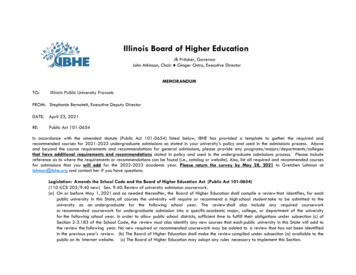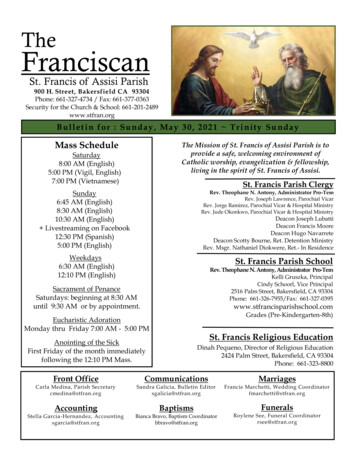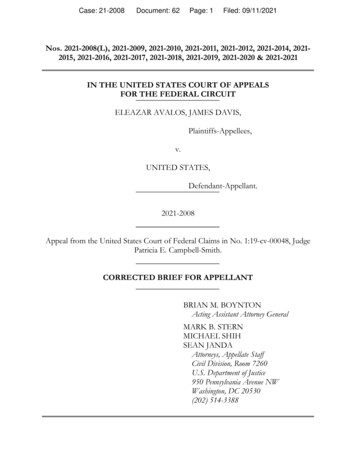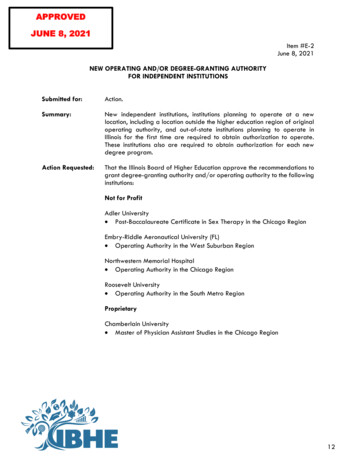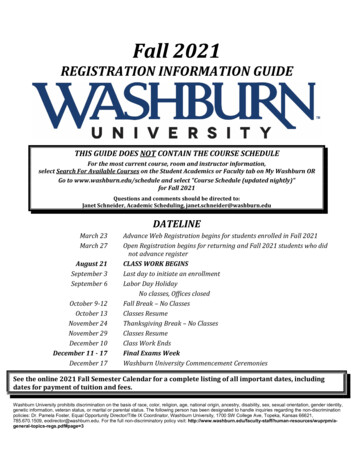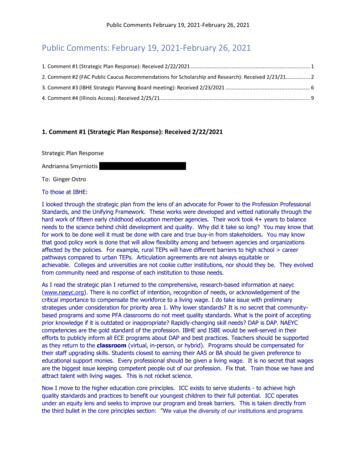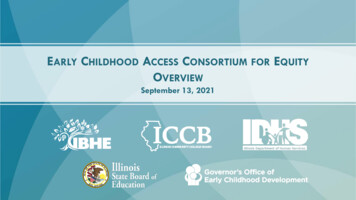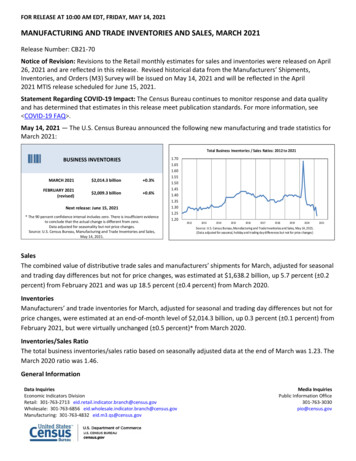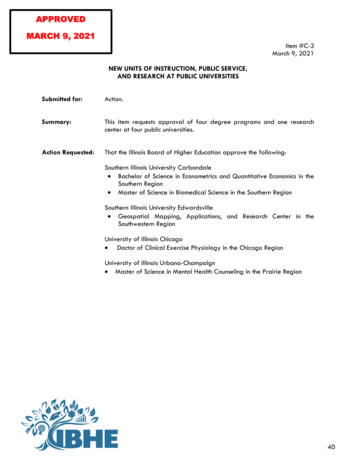
Transcription
APPROVEDMARCH 9, 2021Item #C-3March 9, 2021NEW UNITS OF INSTRUCTION, PUBLIC SERVICE,AND RESEARCH AT PUBLIC UNIVERSITIESSubmitted for:Action.Summary:This item requests approval of four degree programs and one researchcenter at four public universities.Action Requested:That the Illinois Board of Higher Education approve the following:Southern Illinois University Carbondale Bachelor of Science in Econometrics and Quantitative Economics in theSouthern Region Master of Science in Biomedical Science in the Southern RegionSouthern Illinois University Edwardsville Geospatial Mapping, Applications, and Research Center in theSouthwestern RegionUniversity of Illinois Chicago Doctor of Clinical Exercise Physiology in the Chicago RegionUniversity of Illinois Urbana-Champaign Master of Science in Mental Health Counseling in the Prairie Region40
Item #C-3March 9, 2021STATE OF ILLINOISBOARD OF HIGHER EDUCATIONNEW UNITS OF INSTRUCTION, PUBLIC SERVICE,AND RESEARCH AT PUBLIC UNIVERSITIESBy statute, the Illinois Board of Higher Education (IBHE) is responsible for approving new oncampus and off-campus units of instruction, organized research, and public service, and units ofadministration proposed by public university governing boards. The Board’s approval criteria,defined in rules adopted for administering the statute, addresses university mission, academiccontrol, faculty and staff, support services, financial resources, student demand, curriculum,statewide need, and congruence with Board policies and priorities. In addition to the approvalcriteria in rules, each new program was reviewed for its contributions to the goals of The IllinoisPublic Agenda for College and Career Success, which sets forth new priorities to guide Illinois highereducation. Staff recommendations are based on analyses of application materials and responsesto staff questions, and, for advanced degree programs, recommendations of external consultants.Executive Summary – Public InstitutionsSouthern Illinois University Carbondale Bachelor of Science in Econometrics and Quantitative EconomicsSouthern Illinois University Carbondale (SIUC or University) requests authorization to offeran interdisciplinary Bachelor of Science (BS) in Econometrics and Quantitative Economics in theSouthern Region. The proposed program will consist of 39 general education credit hours; 47 credithours of Foundational Business/Economics courses; 24 credit hours of Econometrics, Mathematics,and Computer Programming; and 10 credit hours in electives. The BS in Econometrics andQuantitative Economics is designed for and prepares undergraduates who plan to pursue technicalor professional careers or graduate study in economics, quantitative economics, or other dataoriented positions and programs. The proposed program utilizes existing coursework across threeexisting programs: Economics; Mathematics; and Computer Science, reflecting the intrinsically multiand interdisciplinary nature of economics and data analysis. The proposed program targets astudent demographic that is largely underserved: students of color and students from rural areas.There are policies in place to ensure faculty members possess the training, credentials, andqualifications to provide instruction in the proposed program. The University has sufficient library,technology, staff, and financial resources in place to support the program.Approval request summary, including staff conclusion, follows in Attachment A. Master of Science in Biomedical Sciences in the Southern RegionSouthern Illinois University Carbondale (SIUC or University) requests authorization to offera Master of Science (MS) in Biomedical Sciences in the Southern Region. The proposed program isdesigned for students pursuing health careers to increase their competitiveness for professional41
school application through an earned degree. It is a joint effort by the Southern Illinois University(SIU) School of Medicine and the SIUC campus, taking advantage of resources and expertise acrossthese two SIU entities. The School of Biological Sciences in the College of Agricultural, Life, andPhysical Sciences will administer the program. The MS in Biomedical Sciences requires a minimum of30 credit hours including 19 credit hours in biological sciences courses, nine credit hours of electivecourses, and two credit hours of structured support preparation courses. There are policies in placeto ensure faculty members possess the training, credentials, and qualifications to provide instructionin the proposed program. The University has sufficient library, technology, staff, and financialresources in place to support the program.Approval request summary, including staff conclusion, follows in Attachment B.Southern Illinois University Edwardsville Geospatial Mapping, Applications, and Research Center in the Southwestern RegionSouthern Illinois University Edwardsville (SIUE or the University) requests authorization toestablish the Geospatial Mapping, Applications, and Research Center (GeoMARC or the Center) inthe Southwestern Region. With the current application, the Laboratory for Applied Spatial Analysis(LASA), in existence since 1996, requests to be elevated from laboratory to center status andrenamed the Geospatial Mapping, Applications, and Research Center. Originally founded in theCollege of Arts and Sciences, GeoMARC now resides in the Graduate School. The proposed Centerwill continue to expand on the successes and momentum of LASA to foster multidisciplinary andmulti-institutional collaborations that develop and promote the use of advanced geospatialtechnologies to conduct, lead, and influence research and innovative solutions to meet the needs ofboth private industry and the public sector. The transition of GeoMARC from a departmentalresearch lab into a university-wide research center will allow SIUE to better position itself as areauniversities join forces to take advantage of research dollars associated with the growth of thegeospatial ecosystem in St. Louis. The University has sufficient library, technology, staff, andfinancial resources in place to support the Center.Approval request summary, including staff conclusion, follows in Attachment C.University of Illinois Chicago Doctor of Clinical Exercise Physiology in the Chicago RegionThe University of Illinois Chicago (UIC or University) requests authorization to offer a Doctorof Clinical Exercise Physiology in the Chicago Region. Administered by the Physical TherapyDepartment, the proposed entry-level doctoral program will provide didactic and practical trainingbeyond bachelor’s and master’s programs that are currently available for students that aspire topractice as a clinical exercise physiologist. Professional preparation will involve coursework andpracticum experience in the clinical management of patients with complex health conditions. Theproposed program will equip students to be effective leaders and future program managers byoffering professional development courses. Additionally, the proposed program will preparestudents to sit for several specialized certifications that will grow their skillset and increase theiropportunities for employment. The curriculum consists of 15 required courses including seveninstructional, two professional development, and six clinical courses totaling 50 to 54 hours. Nothesis or dissertation will be required, rather students will complete a portfolio. There are policies42
in place to ensure faculty members possess the training, credentials, and qualifications to provideinstruction in the proposed program. The University has sufficient library, technology, staff, andfinancial resources in place to support the program.Approval request summary, including staff conclusion, follows in Attachment D.University of Illinois Urbana-Champaign Master of Science in Mental Health Counseling in the Prairie RegionThe University of Illinois Urbana-Champaign (University or UIUC) requests authorization tooffer a Master of Science (MS) in Mental Health Counseling in the Prairie Region. The proposedprogram will require a minimum of 60 credit hours including 52 core credit hours coveringfoundations of psychology, psychotherapy, psychopathology, research methods, and counseling;eight elective hours chosen from a selection of human developmental and assessment courses; anda total of 700 clock hours of practicum specific to one of three possible areas of study: MentalHealth Counseling, Career Counseling, or Counseling and Developmental Sciences. The MS in MentalHealth Counseling will prepare students to enter the counseling field as a master’s level professionalor to continue their doctoral studies in applied psychology. Graduates of the mental healthcounseling and career counseling tracks will be licensure eligible as Illinois Licensed ProfessionalCounselors. There are policies in place to ensure faculty members possess the training, credentials,and qualifications to provide instruction in the proposed program. The University has sufficientlibrary, technology, staff, and financial resources in place to support the program.Approval request summary, including staff conclusion, follows in Attachment E.The staff recommends adoption of the following resolutions:The Illinois Board of Higher Education hereby grants to Southern Illinois University Carbondaleauthorization to grant the Bachelor of Science in Econometrics and Quantitative Economics in theSouthern Region, subject to the institution’s implementation and maintenance of the conditions that werepresented in its application and that form the basis upon which this authorization is granted.The Illinois Board of Higher Education hereby grants to Southern Illinois University Carbondaleauthorization to grant the Master of Science in Biomedical Sciences in the Southern Region, subject tothe institution’s implementation and maintenance of the conditions that were presented in its applicationand that form the basis upon which this authorization is granted.The Illinois Board of Higher Education hereby grants to Southern Illinois University Edwardsvilleauthorization to establish the Geospatial Mapping, Applications, and Research Center in the SouthwesternRegion, subject to the institution’s implementation and maintenance of the conditions that were presented in itsapplication and that form the basis upon which this authorization is granted.The Illinois Board of Higher Education hereby grants to University of Illinois Chicago authorization togrant the Doctor of Clinical Exercise Physiology (DCEP) in the Chicago Region, subject to the institution’simplementation and maintenance of the conditions that were presented in its application and that form the basisupon which this authorization is granted.The Illinois Board of Higher Education hereby grants to University of Illinois Urbana-Champaignauthorization to grant the Master of Science in Mental Health Counseling in the Prairie Region, subject to the43
institution’s implementation and maintenance of the conditions that were presented in its application and thatform the basis upon which this authorization is granted.44
Southern Illinois University CarbondaleProposed Degree Title in the Region of Authorization: Bachelor of Science in Econometrics andQuantitative Economics in the Southern RegionProjected Enrollments and Degrees:First YearFifth YearDegrees AwardedEnrollmentEnrollmentFifth Year5155BackgroundSouthern Illinois University Carbondale (University or SIUC) is seeking authorization to offera Bachelor of Science (BS) in Econometrics and Quantitative Economics in the Southern Region. Theproposed program will combine a set of core economics courses providing a strong foundation withadvanced statistical, mathematical, and computer programming skills. Graduates will then be ableto apply these technical skills to employment sectors or graduate programs requiring sophisticatedmarket analyses or economic research. This multi- and interdisciplinary program provides basicknowledge in the foundations of economics, statistics, and computer programming and will preparestudents for careers or graduate study. The degree will be housed in the School of Analytics,Finance, and Economics at Southern Illinois University Carbondale, which already offers a Bachelorof Arts in Economics. SIUC’s School of Analytics, Finance, and Economics, in conjunction with the Centerfor International Education, will promote this program to international students.Institutional Data1050.30(b)(1)(H): Success in student progression and graduation rates across all existing approvedprograms, and success rates in programs preparing students for certification and licensure, shall beconsistent with expectations in higher education and the appropriate related field of study. At aminimum, the Board shall consider these factors based on results for similar institutions. (i) Graduationrates, certificate and degree completion rates, retention rates, and pass rates for licensure andcertification aligned with thresholds set by State nor national regulatory bodies. (ii) The success rateshall be, at a minimum, higher than those of the lowest quartile of these measures for similar Illinoisinstitutions defined as open versus competitive enrollment institutions and primarily associate versusprimarily baccalaureate granting institutions. Exceptions may be made to the lowest quartile if aninstitution is above the national average for these measures using the same comparison categories ofinstitutions.This section includes information about institutional and student success measures for eachinstitution seeking program approval. The institution’s rates will be compared to Illinois institutionsfrom within a select comparison group and against the national standards or averages. For aproposed undergraduate program, this section will include undergraduate graduation rates, firstto second year retention rates, student loan default rates, and any applicable licensure passagerates. For a proposed graduate program, this section will primarily focus on student loan defaultdata since this measure also includes graduate students in the calculation.45
Undergraduate Graduation Rates and RetentionAcademic Year 20%0%Graduation RateSIUCIL Comparison GroupRetention RateNational AverageSource: National System for Education Statistics (NCES), US Department of EducationNote: Southern Illinois University Carbondale is in the four-year selective Illinois comparison group.Higher percentages are positive indicators. The average national six-year graduation rate for fouryear public institutions in fall 2012 was 61 percent with national rates ranging according to institutionalselectivity from 34 to 90 percent. The average national retention rate for public four-year institutionswas 81 percent with national rates ranging according to institutional selectivity from 63 to 97 percent.Undergraduate Graduation RateThe graduation rate measures the rate at which entering freshmen graduate within 150percent of normal program length. Data are provided for six-year graduation rates for first-time,full-time bachelor’s degree-seeking students and three-year graduation rates for full-time associatedegree-seeking students. The national standard for graduation rates is reported annually by theNational Center for Education Statistics (NCES).Undergraduate Retention RateRetention rates examine the percentage of first-time degree seeking students enrolled inthe fall of the prior year that are still enrolled in the fall of the current year. The national standardfor retention rates is reported annually by NCES.46
Undergraduate Completions per 100 FTESouthern IllinoisComparable IllinoisAcademic Year University CarbondaleInstitutions2017-183325.7The full-time equivalent (FTE) data is a unit of measurement intended to represent onestudent enrolled full-time for one academic year. The calculation is based upon credit/contact hoursoffered at an institution divided by a standard minimum (12 credit hour) full-time course load. Thecompletions per 100 FTE data are included to provide a holistic view of completions across differentstudent populations.Three-Year Cohort Student Loan Default CProprietary Instit.10%Not-for-profit Instit.15%20%Public Instit.Source: National Center for Education Statistics (NCES), US Department of EducationNote: The national cohort default rate for fiscal year 2017 is 9.7%.A lower number is a positive indicator.The three-year cohort student loan default rate is the percentage of a school’s borrowerswho enter repayment on certain Federal Family Education Loan Program or William D. Ford FederalDirect Loan Program loans during a particular federal fiscal year, October 1 to September 30,and default or meet other specified conditions prior to the end of the second following fiscal year.Need1050.30(a)(6): A) The unit of instruction, research or public service is educationally and economicallyconsistent with the educational priorities and needs of the State of Illinois. B) The unit of instruction,47
research or public service meets a need that is not currently met by existing institutions and units ofinstruction, research or public service.The field of data analytics is becoming more popular and in greater demand. Employersincreasingly want graduates that can undertake economic and statistical analyses more rigorousthan calculating simple statistics or plotting trends. The Bureau of Labor Statistics’ (BLS) OccupationalOutlook Handbook does not yet break out the relatively new occupation of data scientist, soinformation specific is not available. However, based on the proposed program’s knowledge andskills development, careers for BS in Econometrics and Quantitative Economics include BusinessAnalyst, Economic Forecaster, Financial Advisor/Planner, Actuary, Data Analyst/Research Analyst,and Comptroller, all of which are growing “faster than average” or “much faster than average,”according to the BLS. As well, the BLS projects that closely aligned occupations “softwaredevelopers, applications” are among the fastest growing occupations in the U.S. As well, candidateswith a bachelor’s degree may qualify for some entry-level economist or data science positions,including jobs with the federal government. An advanced degree is sometimes required foradvancement to higher level positions; the proposed BS degree prepares students for graduatestudy.The Illinois Department of Employment Security’s Long-Term COVID19-ImpactedOccupations 2018-2028 indicates that “Computer and Mathematical Occupations” will grow muchfaster than most other occupations in Illinois over the projected decade.The Illinois Public Agenda for College and Career SuccessThe proposed BS in Econometrics and Quantitative Economics supports Goal One,Educational Attainment of the Illinois Public Agenda to increase educational attainment to match thebest-performing states. The availability of an affordable degree in this discipline from a publicinstitution in the Southern Region will increase educational attainment among especially students ofcolor, rural students, and differently-abled students, particularly in a STEM-related field. Providingstudents at SIUC an opportunity to attain quantitative training and explicitly market that trainingwill allow for more graduates from Illinois to compete in the global marketplace.Comparable Programs in IllinoisProgramNameUniversity of IllinoisUrbana-ChampaignBS in Econometrics &Quantitative EconomicsSectorPublic universityInstitutionNorthwesternUniversityBA in EconomicsPrivatenot-for-profitUniversityof ChicagoBA inEconomicsPrivatenot-for-profitThree undergraduate programs in Illinois have the same CIP Code (45.0603) as theproposed program: the Bachelor of Arts (BA) in Economics at Northwestern University; the BA inEconomics at the University of Chicago; and the BS in Econometrics and Quantitative Economics atthe University of Illinois-Champaign (UIUC).48
The program at UIUC is the only other BS in Econometrics and Quantitative Economicsoffered at a public institution in Illinois; that program is approved in the Central Region. Theproposed program at SIUC in the Southern Region would have little to no impact on UIUC’s program.The University of Chicago and Northwestern University both offer a BA in Economics coded as aSTEM field with the CIP Code of 45.0603 because both programs focus on mathematics andstatistics. However, both institutions serve a much different student demographic, are highlyselective, and have tuition costs prohibitive to many. Therefore, the proposed BS in Econometricsand Quantitative Economics at SIUC in the Southern Region would have little to no impact on theUniversity of Chicago and Northwestern University’s programs.Mission and Objectives1050.30(a)(1): A) The objectives of the unit of instruction, research or public service are consistentwith the mission of the college or university. B) The objectives of the unit of instruction, research orpublic service are consistent with what the unit title implies.The program is consistent with the purpose, goals, objectives, and mission of the University.The requested degree title reflects the program’s objectives and curriculum.Curriculum and Assessment1050.30(b)(1) [applicable only to units of instruction]: A) The caliber and content of the curriculummust assure that the objectives of the unit of instruction will be achieved. B) The breadth and depth ofthe curriculum must be consistent with what the title of the unit of instruction implies. C) The admissionand graduation requirements for the unit of instruction must be consistent with the stated objectives ofthe unit of instruction. D) Institutions must show the capacity to develop, deliver and support academicprograms. Procedures and policies that will assure the effective design, conduct and evaluation of thedegree programs under the academic control of the institution must be developed. Assessment plansmust demonstrate that the institution has identified clear and appropriate program and student learninggoals and has defined appropriate outcomes. Appropriate data must be collected and may berequested by the Board to show the level of student learning that has occurred as a result ofparticipation in the institution’s programs of study.1050.30(a)(2): The design, conduct and evaluation of the unit of instruction, research or public serviceare under the direct and continuous control of the sponsoring institution’s established processes foracademic planning and quality maintenance.Admission RequirementsThere are no additional admission requirements to the program beyond general admissionto the institution. General admission requirements include the following: A completed application for admission; A 40 non-refundable application fee. Fees may be waived for students who meetcertain income levels; and Current official high school transcripts.49
CurriculumThe Bachelor of Science in Econometrics and Quantitative Economics is a 120-credit-hourcurriculum that includes the following: General Education/University Core Curriculum coursework – 39 credits Business/Economics Foundation coursework – 47 credits Major course requirements – 24 credits:o Economics course requirements – 13 creditso Mathematics and Computer Science requirements – 11 credits Electives (in Mathematics or Computer Science) – 10 creditsAssessment of Student LearningSouthern Illinois University Carbondale has established processes to measure and analyzestudent learning outcomes data. Direct measures include projects, tests, computer coding, homework,and economic forecasts and analyses. Assessment of the learning outcomes within each course takesplace throughout each semester. Indirect measures of student learning outcomes include studentperformance in Mathematics and Computer Science courses and exit interviews with graduatingseniors. Graduation rates and average time to graduations will be monitored. The program willwork with Career Services to track placement data and will use the request for letters ofrecommendation from students to report on successful employment or graduate school admissions.Program AssessmentThe proposed program will be administratively housed in the School of Analytics, Finance,and Economics. Each year, assessment data will be collected and evaluated by the faculty, fromwhich program improvement decisions will be made. Program assessment includes review of theStudent Learning Objectives, the assessments tools themselves, and assessment of learning outcomesin non-Economics courses. Assessment plans and results will be made available to external reviewersfor feedback.Facilities (space, equipment, instructional materials)1050.30(a)(4): A) Facilities, equipment and instructional resources (e.g., laboratory supplies andequipment, instructional materials, computational equipment) necessary to support the high qualityacademic work in the unit of instruction, research or public service are available and maintained. B)Clinical sites necessary to meet the objectives of the unit of instruction, research or public service. C)Library holdings and acquisitions, owned or contracted for by the institution, that are necessary tosupport high quality instruction and scholarship in the unit of instruction, research and public service,are conveniently available and accessible, and can be maintained.Existing facilities at the University are sufficient for implementing the proposed program.Classroom space and computer resources are sufficient for the program’s needs. The Universitypossesses appropriate library resources, including textbook and journal holdings, to supportteaching and scholarly work.50
Faculty and Staff1050.30(a)(3): A) The academic preparation and experience of faculty and staff ensure that theobjectives of the unit of instruction, research or public service are met. B) The academic preparationand experience of faculty and staff, as evidenced by level of degrees held, professional experience inthe field of study and demonstrated knowledge of the field, ensure that they are able to fulfill theiracademic responsibilities. At a minimum, faculty shall have a degree from an institution accredited bya U.S. Department of Education and/or Council for Higher Education Accreditation recognizedaccrediting body or a degree from another country evaluated for U.S. equivalency in the discipline theywill teach or for which they will develop curricula at least one level above that of the courses beingtaught or developed. C) The involvement of faculty in the unit of instruction, research or public serviceis sufficient to cover the various fields of knowledge encompassed by the unit, to sustain scholarshipappropriate to the unit, and to assure curricular continuity and consistency in student evaluation. E)Support personnel, including but not limited to counselors, administrators, clinical supervisors, andtechnical staff, that are directly assigned to the unit of instruction, research or public service, have theeducational background and experience necessary to carry out their assigned responsibilities.The University has identified institutional policies that ensure faculty and staff hired possessthe training, credentials, and other related qualifications to provide instruction at the institution.Faculty teaching in the proposed program will have the appropriate qualifications. A formal facultyevaluation process is in place.Fiscal and Personnel Resources1050.30(a)(5): A) The financial commitments to support the unit of instruction, research or publicservice are sufficient to ensure that the faculty and staff and support services necessary to offer theunit of instruction, research or public service can be acquired and maintained. B) Projections of revenuesnecessary to support the unit of instruction, research or public service are based on supportableestimates of state appropriations, local tax support, student tuition and fees, private gifts, and/orgovernmental grants and contracts.The University has adequate faculty, staff, and other instructional resources to administerthe proposed program. Existing faculty in the School of Analytics, Finance, and Economics, alongwith existing faculty in the School of Mathematics and Statistical Sciences and the School of Computingwill teach the proposed curriculum.Accreditation and Licensure1050.30(b)(3)[applicable only to units of instruction]: Appropriate steps shall be taken to assure thatprofessional accreditation needed for licensure or entry into a profession as specified in the objectivesof the unit of instruction is maintained or will be granted in a reasonable period of time.No specialized accreditation is required.Program Information1050.30(b)(2)[applicable only to units of instruction]: A) The information which the institutionprovides for students and the public shall include the following: i) An accurate description of the unitof instruction, including its objectives, length, and residency requirements if any; ii) Schedule of tuition,51
fees, and all other charges and expenses necessary for completion of the unit of instruction, cancellationand refund policies; iii) Student rights and responsibilities; iv) A statement regarding the transferabilityof college credits, including the fact that the decision to accept transfer credits is determined by thereceiving institutions; v) A statement as to how the institution will advise students on the nature of thetransfer process, including the importance of consulting with institutions to which the student may seekto transfer; vi) Evidence of arrangements for the transfer of courses or credits or both to institutionalcounterparts, when these arrangements exist; these arrangements are also known as articulationagreements; vii) A statement of the institution’s most recent graduation rates and the numbe
school application through an earned degree. It is a joint effort by the Southern Illinois University (SIU) School of Medicine and the SIUC campus, taking advantage of resources and expertise across these two SIU entities. The School of Biological Sciences in the College of Agricultural, Life, and Physical Sciences will administer the program.
